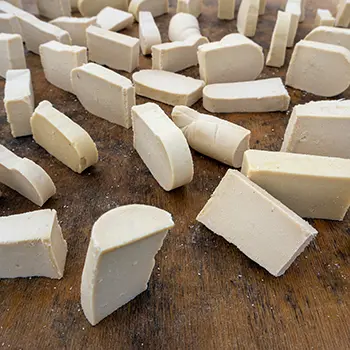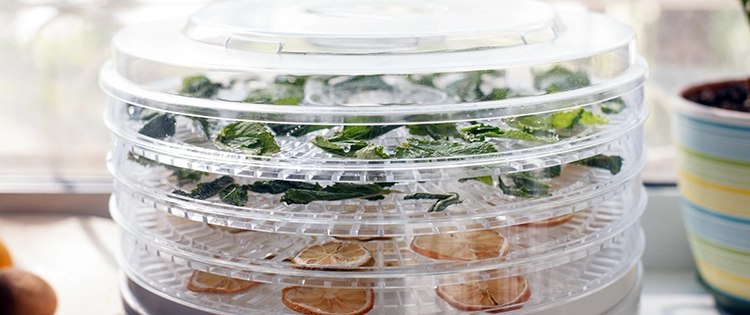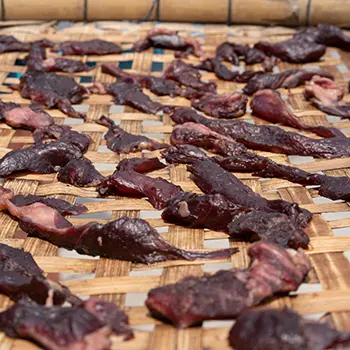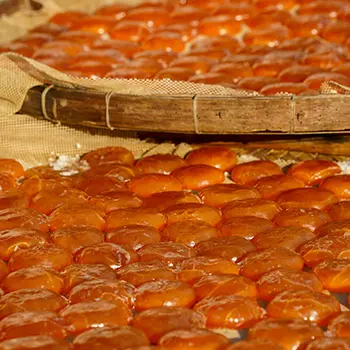Imagine enjoying your favorite foods, fruits, and vegetables all year long without running out of your pantry supplies.
Dehydration, a centuries-old method of food preservation, makes it possible by removing the water content and increasing the shelf life of ingredients. Packed with almost the same nutrient content as fresh foods, boasting reduced wastage, and a lower price tag, dehydrated foods can be your ultimate life-saver.
Let’s get started.
Cheese
Dehydrating cheese involves shredding and placing it on dehydrator trays at 130°F (54°C) for 6-10 hours until fully dry. Store dehydrated cheese in airtight containers in a cool, dry place. Properly stored, dehydrated cheese can last up to 12 months.
In comparison, refrigerated cheese typically lasts only a few weeks. Dehydration significantly extends its shelf life and reduces the risk of mold growth.
Herbs
Dried herbs have a longer shelf life and last for years, while fresh ones typically spoil within a few days. Dehydration removes moisture from herbs, inhibiting microorganism growth and preserving flavor by preventing oxidation over time. Here are some tips for drying different types of them:
- Herbs like basil, lemon, mint, and parsley with higher moisture levels should be dried quickly to prevent mold growth. Use the dehydrator at 95-110°F or (35-43°C) or the oven with a low heat setting to dry them.
- However, rosemary, oregano, thyme, and bay leaves have low water content and should not be sun-dried. Instead, tie them together and hang them in a dry and warm place, with good air circulation.
According to the United States Department of Agriculture (USDA), the recommended shelf life over which herbs will retain their quality and nutrition is 1-2 years.
Lean Meats
Fresh meat tends to spoil quickly due to its high protein content, which provides a fertile environment for microbial activity. Further, enzymatic processes, slightly acidic pH, and glycogen contribute to the decay of meat over time. That’s why dehydrating meat is the best way to reduce biochemical reactions, slow down microbial spoilage, and prevent the breakdown of meat tissue.
Lean meats are easier to dry and are usually preserved in jerky, a tradition that dates back to ancient times. You can make beef, fish, chicken, or turkey jerky that is portable and perfect for outdoor activities. Moreover, it is rich in nutrients like iron, zinc, vitamin B12, and niacin.
To store the lean meats, cut them into thin, uniform slices and marinate them with spices overnight. Dry the meat in the baking oven, or food dehydrator at 165°F (74°C) for poultry or 160°F (71°C) for beef. Once cooled, put them in tight containers. If stored and kept in refrigerators, they can easily be used for 1-2 months.
Fruits
Dehydration works in fruits by passing hot air until 80 percent of the moisture evaporates. When dried, you get lightweight, thin, and chewy versions. Use them as snacks or add them to different dishes for extra punch, enhanced flavor, and crumbled texture.
Whether you want to dehydrate apples, bananas, mangoes, cherries, figs, or blueberries, here are the steps to follow:
- Choose fresh and ripe fruits and wash them thoroughly. Peel fruits like apples or pears with thicker skins.
- Fruits like bananas and apples that may oxidize should be pre-treated by dipping them into citric acid or lemon solution.
- Keep the dehydrator to 125-135°F (50-57°C) or, the oven to (140-150°F or 60-65°C). Place the fruit slices over the tray.
- Once dried and cooled, store them in air-tight containers.
The USDA suggests that preserved fruits can be kept for 6 months when saved in a refrigerator or pantry,
Eggs
To dehydrate eggs, beat them, pour onto dehydrator trays lined with parchment paper, and dry at 145°F (63°C) for 6-8 hours until completely dry. Grind into powder if desired. Store in airtight containers. Dehydrated eggs can last up to 12 months when stored properly.
Refrigerated eggs, on the other hand, last about 3-5 weeks. Dehydration provides a much longer shelf life and is ideal for long-term storage.
Sauces
Dehydration restricts the microbial growth by reducing the water content of the sauces. Hence, these can be stored at room temperature without refrigeration for lengthier spans. Using the proper drying technique helps maintain the sauce’s flavor and nutrients. You can easily dehydrate the following sauces:
- Barbecue sauce
- Pasta sauce
- Hot sauce
- Spaghetti sauce
Spread the sauce evenly over non-stick sheets placed over the dehydrator trays. Dry them at 57°C or 135°F for 8-12 hours until they turn brittle. Grind it into fine powder. Rehydrate by adding water or other liquids to restore the consistency.
Depending on the kind of sauce, ingredients used, and storage conditions, they can last for weeks up to a year.
Potatoes
Dried potatoes are used in many recipes, from soups, salads, stews, fries, casseroles, and much more. Once dried out, these become lightweight, quick to store, and handy to use as compared to fresh potatoes. Certain potato varieties like Russet or Idaho dehydrate better than waxy ones. Also, make sure the potatoes are blemish-free.
To dehydrate the potatoes, wash and soak them in cold water. Peel them off and cut them into thin slices. Blanch them in boiling water for 3 minutes, rinse them in ice-cold water, and spread them over the tray. Let them completely dry before putting them into the dehydrator or oven.
Once dehydrated, you can keep them in a covered jar for 4 months or more than 2 years if vacuum sealed.
Syrups
Syrups are dried to convert them into granulated or crystallized form, which is then stored and later kept for various cooking, baking, beverages, and food preparation. This preserves their flavor and sweet texture for a lengthier span. Here’s the list of some syrups you can store:
- Maple Syrup
- Honey
- Corn syrup
- Fruit syrups
- Agave syrup
- Molasses
To remove the water content from the syrup, spread a thin layer on the tray or a silicon mat. Use a food dehydrator or oven at low temperatures. Dehydrating syrups can take 6 to 12 hours, depending on the kind of syrup, drying technique, and level of moisture.
Milk
Pour milk onto dehydrator trays lined with parchment paper and dry at 135°F (57°C) for 12-18 hours until completely dry. Grind into powder if desired. Store in airtight containers. Dehydrated milk can last up to 12 months when stored properly.
In contrast, fresh milk lasts about a week in the fridge. Dehydrated milk offers a much longer shelf life and is convenient for use in recipes and beverages.
Mushrooms
Dried mushrooms are a better alternative to fresh ones due to lower salt levels, greater lifetime, and higher nutrient content.
Fresh mushrooms contain 80 to 90% water and have porous, textured skin that quickly absorbs moisture. To prolong their lifetime, they should be desiccated to reduce water content and prevent sliminess. Note, do not wash them before drying.
To dehydrate the mushroom, use the following steps:
- Remove dirt from the mushroom with a damp piece of clean cloth. Additionally, cut off any tough stems with the knife or by hand,
- Slice the mushrooms into ¼ th inch or smaller pieces.
- Dry them off in a dehydrator at 125°F (52°C) for 3-8 hours or in the oven at the lowest temperature.
Once dried and kept in a sealed container, they can last for 1-2 years. However, if opened, they will remain only fresh for 3 months.
Takeaway
If you want to stock up on out-of-season food items or cut costs on future meals, invest in dehydrated foods. They are lightweight, easy to carry, and require minimal storage space, making them a practical choice for the longer run.
Preserve your food supplies for use year-round, and enjoy the luxury of having quick and nutritious meals whenever you want by following the steps mentioned above.
100+ Long Lasting Foods that Can be Stored Without Refrigeration (Video)
What You Should Stockpile For The Next Great Depression













